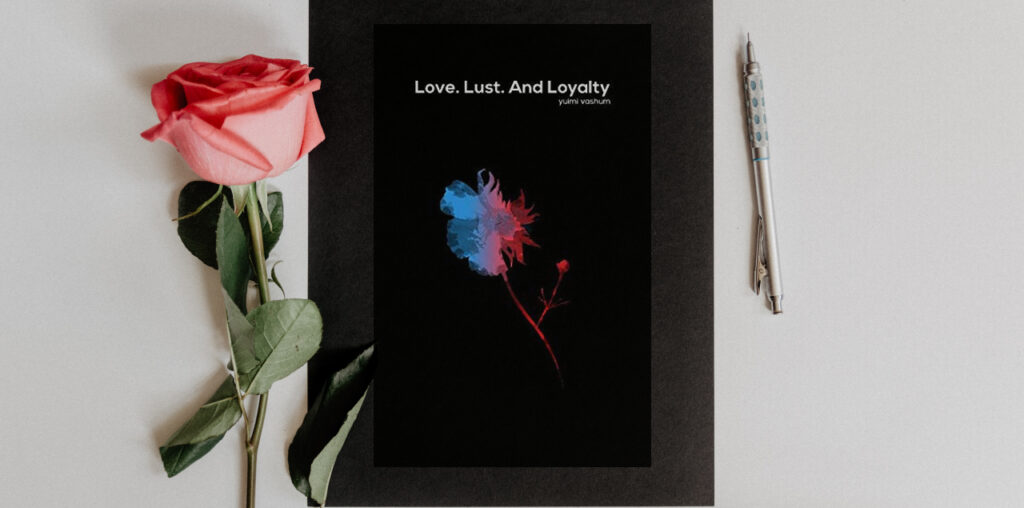Yuimi Vashum’s Love. Lust. And Loyalty is a profoundly personal, honest exploration of emotions, questions, and confusion one experiences and feels as a victim of child sexual abuse (CSA); without rancor or self-pity, the book mourns the loss of trust and innocence, sense of betrayal, the immense self-doubt and unimaginable trauma, the anger and fears that comes with it.
And yet, it is also about finding strength, healing and reclaiming oneself, and the ultimate triumph one finds in confronting and owning the fact of being sexually abused as a child; to transform from a victim to someone who possess the courage, resilience, and fortitude to choose to accept, to forgive as well, find closure and move on. And by doing that, the book is also about hope—the hope that permits one to embrace the future and walk the path of love.
The book is not about data or numbers; instead it abruptly pushes us into the unvarnished blunt fact that CSA happens and is happening right among us; right on beds we may have sat on, in rooms we may have been where we perhaps sipped tea while talking about mundane things like the weather, or in other innocuous settings such as schools or the workplace.
Overwhelming data (a 2002 World Health Organisation study estimated 73 million boys and 150 million girls below 18 years had experienced various forms of sexual violence worldwide; that’s roughly 74 times the population of the Nagas as a whole) and recent published incidents of sexual violence involving minors makes it no longer possible for the Naga society to deny that such “morally deviant” acts do not happen in “our” Christian society. Vashum’s book is a testament of this fact.
In bringing forth this testimony, she brings what is a deeply personal journey into the public sphere, reconstructing her individual experience into one that challenges the society as a whole.
In the first section of the book “Forgiveness”, armed conflict, a common denominator for Nagas who grew up before the 2000s, where “Women walked home without heads/ Men crawled home without limbs” is the context in which a one-year old child is parted from the security of her mother’s bosom and taken to a supposedly more secure town which soon wailed in gunshots and where “men and monsters would appear” under the bed.
The majority of sexual violence, including CSA, is perpetrated by person(s) known to the victim and the condition in which abuse happens does not necessarily entail physical force, especially when it involves a child. It could be a piece of chocolate that buys silence or it could be the promise of the story of Robinhood told through “a tiny illustration book”. The trauma and confusion as a consequence is palpable as Vashum writes, “I still have my haunted dark days,/ A whirlpool of emotions trying to suck me in.” Further, “At first I was Confused./ Of reality, of actions./ Thinking it was my job to lay quiet at night/ Until the monster(s) leave;/ Wondering if that was what everyone did./…Most of us, we survive; most of us, we befriend trauma. ”
For Nagas, the challenge and difficulty of confronting issues such as CSA is made much more difficult by the fact that serious discussion of sex and sexuality verges on the edge of being taboo. Vashum writes with frustration, “…Yet they refuse to talk about my vagina;/ Of the men that abused me ad infinitum,/…Was it shame? Was it disgust?/ …Hidden behind a piece of cloth,/ They talk about it in hushed tones./ Why would mother(s) not talk about vagina?/ Don’t they know it is as important as my limbs?”
The unwillingness to talk about sex or sexuality becomes more potent when mixed with the vague and arbitrary yardstick of morality, virtue, and purity that is tied to one’s virginity. She questions this commenting, “All of them lecturing Your virginity is your virtue/ Do they know? Do they think about girls like me?” She passionately refutes this archaic notion by affirming “Virtue lies in the head,/ In the heart;/ Definitely not between my legs!/ Because, in my head,/ No buried nights or fucks can yank away my decency.”
Finding catharsis through reclaiming her voice—and encouraging the voice of others like hers—is clearly an objective for the author. However, as Vashum candidly points out, she writes “…to break the shame in honesty./…To forgive, forget, and only live;/ That, what is done to us in the shadows/ Shall not stop us from living life.”
It is this ability to choose to forgive and find closure that strengthens her to explore another facet of her life. The second section of the book “Love. Lust. Loyalty” is a self-affirmation that the author’s experience of CSA does not define her. Instead she moves into the “mundane and normal”, into the unpredictable realm of relationship—of love, some unrequited; of honest lust; of fleeting acquaintances; of heartaches; of the burdens of pining for someone. Here again Vashum is, if not anything, candid and forthright.
In most of the pieces in this section, a subtle underlying sense of urgency seems to be present with time being a regular factor. There is a lustful impatience to savour moments and yet such emotions are offset by the apprehension of what comes afterwards. In my favorite from this section, she writes, “It’s not loving you that I am scared of;/ It’s the anxiety of anticipating your goodbyes/ Even right after your hellos.” Similar anxiousness of the future, of things after the fact, is echoed in much of the other pieces as well (“Forgetting Us”, “Wildfire Love”, “From Mine to Hers”, “Moving On”, “Lovers and Infidels”).
Placed within the discussions of love, lust, and loyalty, body image and self-consciousness also finds mention. In “Shame-less”, Vashum, by talking about her body forces us to examine how much of how we view ourselves is conveyed through the lens of others which often can be wanting. She expounds on this further in “Breast, Bottom, Hair, and Folly”.
As with anything love, there are attempts to explore whether what one feels is really love or lust—in any case what is love? Vashum doesn’t presume to give answers, rather readers are left hanging with the abstraction that “Love is a poor man’s gold.”
There is a quiet dignity in how Vashum manages to bring all the main themes together. The poems, taken separately, each tells a story, an experience. However, the book taken as a whole would have benefitted greatly from a more logical arrangement of the pieces. Related subjects/themes and events seem to be haphazardly ordered that one has to go back and forth to get a better coherent picture in the narrative. Despite this, it is clear that the courage and honest vulnerability with which Vashum writes makes Love. Lust. And Loyalty a book that one will surely come back to again and again.
In recent years, there have been a number of books written by Naga authors; yet most tend to revolve around themes of nationalism, patriotism with the Naga peoples’ struggle for self-determination as a backdrop. Love. Lust. And Loyalty is a refreshing shift from this trend. Significantly, it has opened the bulwark that prevented the Naga society from confronting and addressing the serious issue of CSA. As Vashum writes in her acknowledgment, the book is a “movement to break the silence”.
I dare say the book is a revolution.
Book Review by Chinx Lim

